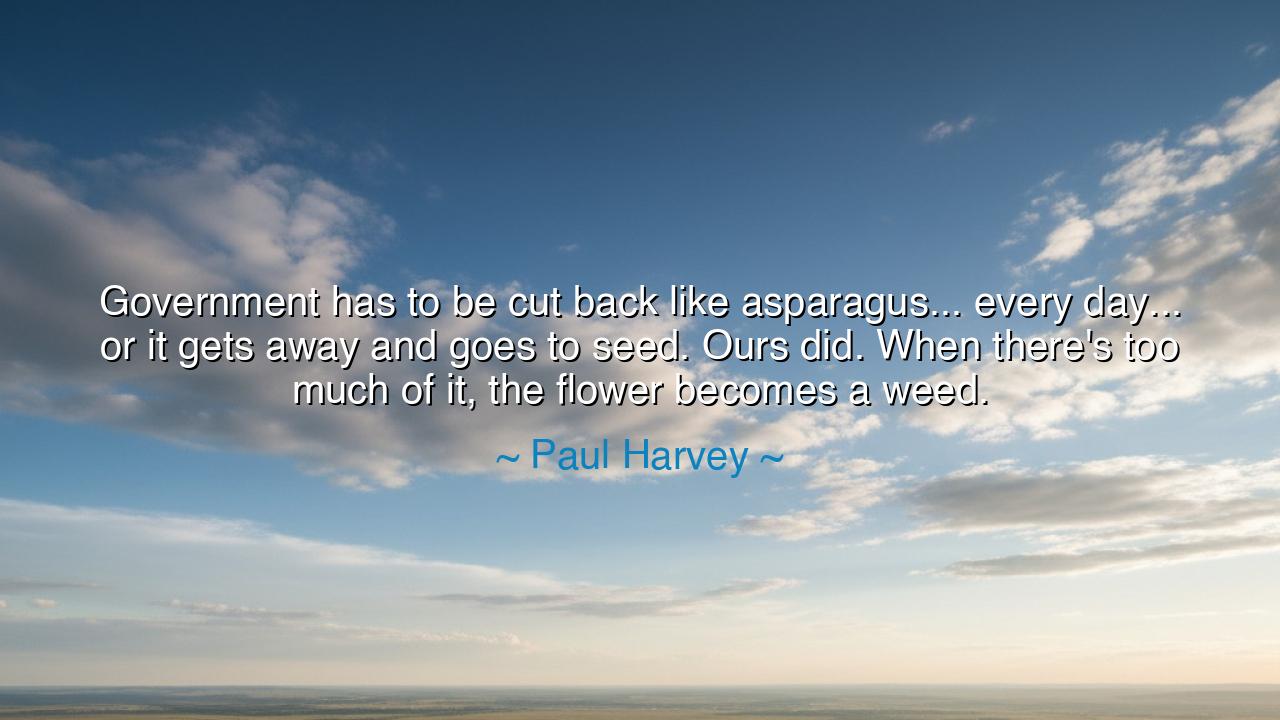
Government has to be cut back like asparagus... every day... or
Government has to be cut back like asparagus... every day... or it gets away and goes to seed. Ours did. When there's too much of it, the flower becomes a weed.






When Paul Harvey declared, “Government has to be cut back like asparagus... every day... or it gets away and goes to seed. Ours did. When there's too much of it, the flower becomes a weed,” he was not merely speaking as a radio commentator — he was speaking as a moral gardener of democracy. His words, though simple and homespun, carry the ancient wisdom that all things of power must be tended, restrained, and pruned lest they consume what they were meant to nourish. In his poetic metaphor, Harvey likens government to a living plant: when young and disciplined, it is fruitful and good; but when left untrimmed, it grows wild, choking the garden it was meant to serve. His message is one of vigilance — that freedom withers when authority runs unchecked, and that every generation must take up the shears of responsibility to keep liberty from being strangled by its own guardians.
The origin of this quote comes from Harvey’s lifelong observation of American life, voiced through his radio broadcasts that reached millions across the 20th century. Known for his storytelling and his deep belief in personal responsibility, Harvey often warned that the slow growth of government bureaucracy — though subtle at first — can become suffocating over time. Like weeds in a garden, each new rule, tax, or office begins as something small and well-intentioned, but when unrestrained, they spread, multiplying faster than they can be managed. His image of asparagus — a plant that must be cut back daily to remain tender and fruitful — captures a profound truth: that liberty is not self-sustaining. It demands constant vigilance, continual trimming, and the courage to restrain excess even when it comes cloaked in good intentions.
In the style of the ancients, Harvey’s parable might have been spoken in the agora of Athens or inscribed on the walls of Rome. For the ancients, too, knew that the greatest danger to freedom lies not in sudden tyranny, but in gradual overgrowth. Plato warned that democracy, left without discipline, decays into chaos, and chaos gives birth to despotism. Cicero, watching the Roman Republic crumble under the weight of its own bureaucracy and corruption, lamented that laws had multiplied even as justice declined. So too did Harvey see in modern America a mirror of that old tragedy — a people so enamored with the idea of security that they forgot the cost of dependence. In his voice there is both sorrow and warning: that the republic, once founded in simplicity and virtue, risks being devoured by its own abundance.
History has offered vivid examples of what Harvey meant when he said, “When there’s too much of it, the flower becomes a weed.” Consider the story of the late Roman Empire, when government expanded to feed its growing ambitions — taxing the poor, subsidizing luxury, and sustaining armies that could no longer defend its borders. What began as a proud system of law and order became an empire of waste and greed. The bureaucracy grew fat while the citizenry grew weary, until the empire’s grandeur withered into ruin. Rome’s government, once the flower of civilization, became the weed that choked its own soil. Harvey’s words, spoken centuries later, carry the same echo: that power, unchecked, will always devour itself.
Yet his message is not one of despair — it is a call to renewal. Harvey believed in the enduring goodness of the people, in their ability to reclaim the spirit of independence that built nations and civilizations alike. The pruning he speaks of is not destruction; it is discipline. Just as a gardener cuts back the plant not to kill it but to make it thrive, citizens must insist on accountability, transparency, and restraint not to dismantle their government but to restore its strength. He urges every listener, every voter, to see themselves as caretakers of a living heritage — to remember that government exists not to rule the people, but to serve them, and that service must always remain humble and measured.
There is also a deep emotional resonance in Harvey’s image of the flower turned weed. It is the tragedy of beauty spoiled by neglect, of order consumed by excess. A government born from noble ideals — liberty, justice, equality — can lose its fragrance when it forgets moderation. The same applies to the human soul: unchecked pride, greed, or complacency can transform virtue into vice. Thus, his warning is not only political but philosophical — a reminder that all things, from nations to hearts, require self-examination and restraint if they are to remain pure.
The lesson of Paul Harvey’s words is therefore timeless: freedom must be pruned, or it will perish. Governments, like gardens, need constant care — a steady hand that trims excess without uprooting purpose. Citizens must remain alert, informed, and courageous enough to question when power grows too fast or spreads too far. For liberty, once lost, cannot easily be replanted.
So let these words pass down as both warning and wisdom: Do not let the flower of government become a weed. Nurture it with justice, trim it with humility, and watch that it serves, not suffocates, the soil from which it sprang — the people. For the republic is a living thing, and if we do not tend it daily with courage and conscience, its blossoms of freedom will fade, and only the thorns of control will remain.






AAdministratorAdministrator
Welcome, honored guests. Please leave a comment, we will respond soon